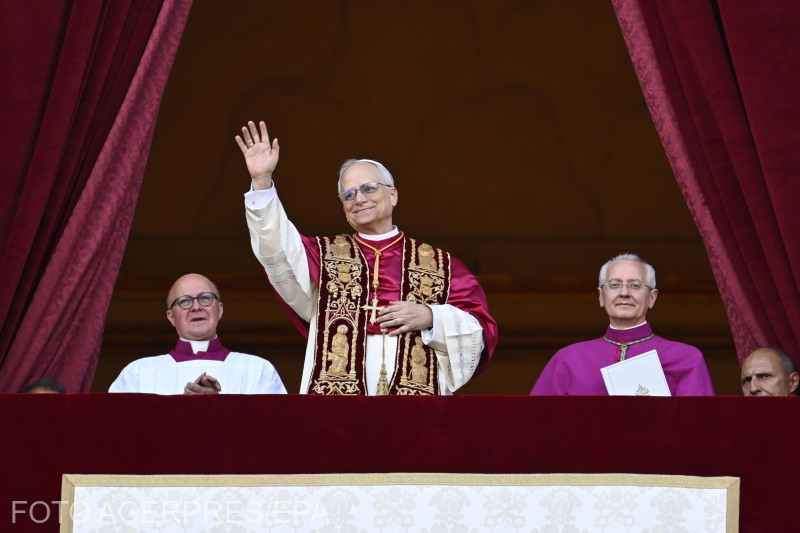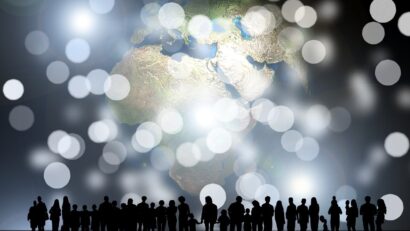White Smoke at the Vatican
133 cardinals from around the world elected a new sovereign pontiff, American Cardinal Robert Francis Prevost

Corina Cristea, 16.05.2025, 13:00
The doors of the Sistine Chapel at the Vatican were sealed on May 7, signaling the beginning of a secret conclave in which 133 cardinals from around the world elected a new sovereign pontiff, successor to Pope Francis – American Cardinal Robert Francis Prevost, who chose the pontifical name Leo XIV. The choice of this name is a tribute to Leo XIII, the 19th-century pope who defended workers’ rights during the first industrial revolution, the new sovereign pontiff explained. Shortly after the Habemus Papam! announcement, addressing the crowd gathered in St. Peter’s Square, the 267th successor of Saint Peter, the new spiritual leader for a community of some 1.4 billion Catholics, spoke of peace, of a church open to all, of the importance of finding bridges of dialogue.
Here is George Bologan, Romanian ambassador to the Holy See:
“With this greeting he appeared on the balcony. He will be a mediator of peace. This was the greeting sent to tens of thousands of believers in St. Peter’s Square. God loves us all, unconditionally. Evil will not prevail. United hand in hand with God and among ourselves, let us move forward! That idea of gathering together all the people who believe in the same values, because, in the end, both evil and good enter the world through us. Therefore, the call that the new Pope made is to go together and have the courage, those who are or are on the side of good, not to leave room in life for those who are on the side of evil.”
Leo XIV will have to address several issues that the sovereign Argentine pontiff left in suspense, EFE commented, reviewing the challenges that the new pope will face. It would be about unity, for example, notes the agency, according to which, in the 12 years of Pope Francis’ pontificate and, although the cardinals do not want to admit it, a Church divided into two wings could be observed, one more moderate and the other more conservative, extremely critical of Pope Francis’ overtures. Thus, the attempt to unite the different positions will be strategic, as will be the continuation on the path of ‘synodality’, namely to build a Church in which everyone has a voice, even if many do not like the idea. Another topic concerns the finances of the Vatican, which is facing a situation in which donations to the Church have decreased considerably. Sexual abuse is another hot spot. Although Pope Francis has established several norms to combat sexual abuse in the Church, much remains to be done, and victims’ associations are demanding the application of these laws in dioceses, greater transparency in the Vatican’s management and in trials, and, above all, faster procedures and investigations. The possible female diaconate, along with a greater presence of women in positions of power, will be another challenge, since many Catholic groups will not give up their demands, and with the death of Pope Francis, it seems that the possibility of women becoming priests, but also the possibility of women serving as deacons, has been almost definitively closed. Last but not least, and without exhausting the list of challenges, is the issue of blessings for homosexual couples. “Fiducia Supplicans”, a text published by the Congregation for the Doctrine of the Faith, which explains that even same-sex couples can receive blessings, has created divisions within the Catholic Church. The African Church unanimously opposed this document and asked Pope Francis for explanations, and now the new sovereign pontiff will have to answer to the bishops on one of the continents where Catholicism is growing.
On Radio Romania, Ambassador George Bologan also referred to the challenges that Pope Leo XIV will have to face:
“The challenges of the pontificate start from the climate of international politics, which is quite turbulent. Then, others, from artificial intelligence, to aspects of a spiritual, cultural and anthropological nature. Moreover, since we are in the age of artificial intelligence, Leo XIV will be able to offer a variant of spiritual intelligence, the one that seeks the meaning of life. In a world immersed in algorithms and data, man’s concerns regarding his purpose in the world remain unchanged and he needs to reconnect with the sacred, and for this he needs a guide, a teacher, and technology is not ultimately the ultimate goal of man. I believe that he will promote a culture of encounter, of dialogue, in a world that erects walls built of national resentments. Also, I think he is a charismatic pope, well prepared. And the quality of being a polyglot best embodies the meaning of catholicity, that is, of universality. He is the first successor of Peter who comes from the USA. He will be a pope who will build bridges and will try to guide and teach a humanity disoriented and marked by crises of world order or disorder.”
He can be described as a sober, reflective shepherd, added the Romanian ambassador to the Holy See, who wants a church capable of listening and healing the despair of contemporary man. At the same time, he is attentive to the liturgical celebration, because that is actually the place where man meets the divine mystery.






























